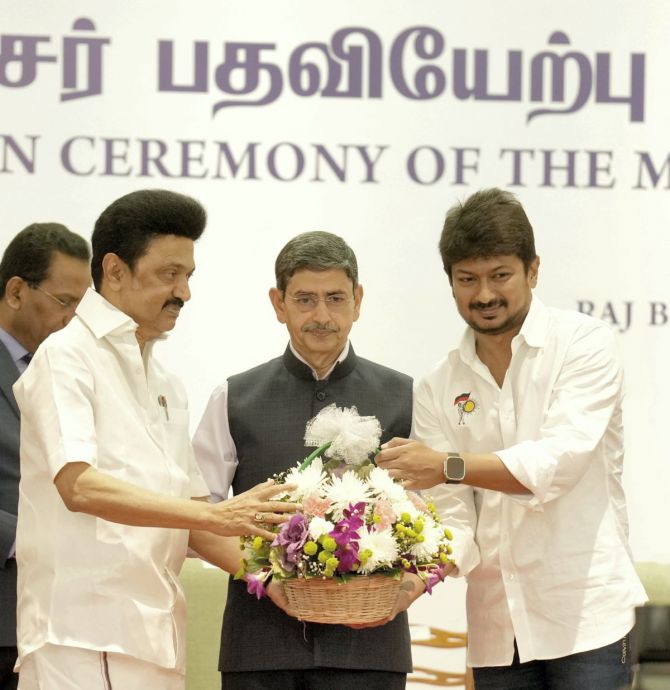What does Udhayanidhi's induction as minister mean?
For the DMK, it indicates the future course, direction and leadership.
It is continuity with change, and change with continuity, points out N Sathiya Moorthy.

The induction of Udhayanidhi Stalin, the legislator-son of Tamil Nadu's DMK Chief Minister M K Stalin, into the state Cabinet was expected ever since the party won the state assembly election in May 2021.
The delay was reportedly caused by the need for the 45-year MLA from Chennai's Chepauk-Thiruvallikeni (once held by grandfather M Karunanidhi) owed also to the need for Udhaya to complete his commitments to the Tamil film industry, where he is an actor, producer and distributor, lest there should be 'conflict of interest' charges, among others.
There is also a common belief that people take only a 'full-time' politician seriously, more so if he is a minister who is being prepared for the chief minister's job in time.
Yes, Stalin and Udhayanidhi cannot escape the charge of perpetuating 'family rule' after Karunanidhi in his long tenure had inducted Stalin first, preceded by the former's nephew Murasoli Maran and succeeded by another son, M K Azhagiri, and daughter Kanimozhi.
After Maran's death, his son Dayanidhi Maran became the Lok Sabha member from Central Chennai and also communications minister under then prime minister Manmohan Singh.
Today, both Kanimozhi and Dayanidhi are among the popularly-elected DMK MPs while Azhagiri fell by the wayside after challenging his late father's diktat on inner-party affairs.
The anti-DMK, anti-Stalin media is eagerly awaiting Azhagiri's comments on Udhaya's elevation.
What does Udhayanidhi's induction mean? For the party, it indicates the future course, direction and leadership.
It is continuity with change, and change with continuity.
On the ideological front, through his public speeches, Udhaya has proven that he is an unadulterated product of the Periyar brand of 'Dravidian thinking', where Stalin too has followed up on his father's anti-god political policies but without letting it interfere with popular sentiments when it comes to Hinduism and Hindu institutions, as often misunderstood and misinterpreted.
Periyar was anti-god, but only when it came to Hinduism. Seldom did he speak about other religions, namely, Islam and Christianity.
Under his chief protege turned challenger, C N Annadurai, the breakaway DMK declared 'one community, one god' (Ondrey kulam, oruvaney deiyvam) as its dictum.
Karunanidhi followed in Annadurai's footsteps, if at all.
Stalin in his time is less strident about his personal beliefs and more open about the freedom for wife Durga Stalin to offer prayers at Hindu temples across the state (as often she wants to), and even in faraway Kaasi and nearby Tirupati.
Udhaya's evolution on this score will be keenly watched.
It could be a defining moment in his political career, as going beyond the traditional yet small anti-DMK/anti-Periyar constituency, people are looking for a moderate, middle-of-the-road leader, and not an ideological confrontationist.
This is the problem with the state Bharatiya Janata Party as also the All India Anna DMK which gave up Periyar's ideology long ago, and does not make a song and dance of it.
Anyway, there is no denying the fact that Udhayanidhi's induction is taking place on an auspicious day, as per the Hindu panchang. The time is also equally auspicious for marriage muhurats.
This, the critics call, hypocritical, but many others see it as done under Durga Stalin's influence on the family -- however limited or otherwise it may be.

But that is only a starting point, with not even half the bridge crossed.
By inducting Udhaya into the cabinet, after giving him a second term as the party's youth wing secretary, Stalin has drawn up the line of succession.
It applies also to the job of chief minister for Udhaya in his time (that is whenever the DMK won the assembly polls).
Though known for long, but by going through with the formality, Stalin has sealed future debates within the party.
By the same token, Stalin has also served notice on seniors, both in the party and more so in the government.
There is a valid reason for this, as many of the veterans have also passed their prime, both in terms of age and efficiency -- but they refuse to leave.
The out-of-turn public speeches of some, and actions of a few others, have embarrassed the party, government and the leader, repeatedly, but they refuse to follow sane advice from the top. Or, that is the impression.
There are those that fear that with a team like this, the DMK cannot hope to go to the people, especially in the 2026 assembly polls.
Going by that precedent, how Stalin manages the transition in the coming months and years will be keenly watched.
If he starts axing his senior ministers, he will get support from local-level district leaders, whose emergence they had blocked for years and decades.
The fact that some of them have brought their sons into politics, possibly as an MP or MLA, may make that transition both smooth and hard -- as 'outsiders' at the district-level would feel once again cheated.
How Udhayanidhi wades through those potholes without hurting others and himself will show who is the boss in the future.
As for as quality politicians as his ministerial aides are concerned -- of which there is an absolute dearth among the younger generation MLAs in every party -- Stalin has set the ball rolling by inducting an international banking pro in Palanivel Thiaga Rajan as his finance minister, and also giving him both functional freedom and promotional avenues -- which would not have been the case in an earlier generation, especially under arch-rival Jayalalithaa.
Barring those like Industry Minister Thangam Thennarasu, an engineering graduate with adequate and equally respectable private sector exposure, and School Education Minister Anbil Mahesh Poyyamozhi, with an MBA, there is hardly any visible talent.
In his own way, HR&CE Minister P K Sekarbabu has proved himself to be useful in promoting the otherwise non-existent image of Stalin among the Hindu faithful and the constituencies that they comprise.

All of it means that for Udhayanidhi to face Tamil Nadu of the future as a leader in his own way, he will have to begin inducting his own team, who are as efficient and effective as they are loyal.
It is going to be a tall order. He also has to learn to work with existing teams.
Coming in when he is in the mid-forties, it is not going to be easy.
At that age, one would have attained a certain level of maturity. He or she would also be uncomfortable with a few people and situations, for their own reasons.
Before all these, Udhayanidhi will have to prove himself as a good administrator in his own right.
His schooling in public administration is for a time, but afterward, he will be on his own -- rather, he will have to groom others, both politicians and bureaucrats to measure up to the increasing complexities of public administration in the years and decades to come.
The portfolios given to him, namely, youth welfare and sports development, are often reserved for the youngest and newest, which Udhayanadhi now is.
Though media reports had also mentioned special programmes implementation department, under Stalin's care, the idea seems to have been shelved, at least for the time being, until the new minister settles down in his.
Like the Chennai mayor's job (1996) and that of the local administration portfolio in his first innings as cabinet minister (2006), special programmes was expected to give Udhayanidhi greater exposure and rich experience in public administration, be it dealing with fellow ministers, multiple civil servants or the people at large.
Already, social media has dubbed Udhayanidhi as deputy chief minister without designation, but it also implies the responsibilities he would be facing and shouldering, as the scheme is popular and Udhayanidhi would be interacting with almost every minister and bureaucrat, whose numbers could be legion.
To put it mildly, it is back-breaking work, especially when he starts touring the state as a minister and begins receiving petitions and memoranda, personally and through post.

Udhayanidhi is not as fortunate as his father, to have had vast political experience and administrative exposure. He joined the DMK formally less than five years back, and his rise is meteoric, to use a cliché -- but not unexpected.
The cadres are happy for him, happy with him, not as what critics dub as 'family rule'. Karunanidhi had an explanation for this, whatever he might have said otherwise, defending himself against the charge of 'family rule'.
'There is only so much I or any father can do, that too inside the party. It is for the voters to decide whether they want a particular person in power or not.'
In his time, Udhayanidhi too will face that challenge. Stalin won the race finally, when the opportunity really came his way in 2011.
Despite all that the critics said on the social media about his student life, Periyar's anti-god philosophy and the like, the Tamil voter trusted him as a sincere and serious political administrator who wanted to do something, and needed to be given a chance. That won the day for him.
For Udhayanidhi to be accepted as chief ministerial material, in his time, he has to convince the voter that he is a good administrator in his own right, even if it is in his own way.
In between, yes, critics would paint the DMK in all shades of grey and black, by constantly referring to 'family rule'.
Until proved otherwise, it has no electoral purchase in the state barring the same constituency that a combination of factors that are prima facie anti-DMK from the start.
Party leaders and cadres are unconcerned about the criticism about 'family rule' or 'dynasty rule'. They say, even six years after Jayalalithaa's death, if the AIADMK infighting in, three -- or, is it four -- ways is continuing, it owed to the absence of a succession plan in Amma's time.
They also point out how across the country, various chief ministers and political leaders, including those in the BJP, have inducted their sons into positions of elected power, and for valid reasons.
Despite his carefully groomed half-grown beard and casually-worn moustache, for Udhayanidhi, the innocent boy-next-door image refuses to go away.
He looks younger than his 45 years. His image as a happy-go-lucky guy bitten by the love bug in films like his debut movie Oru Kal, Oru Kannaadi (2012) still haunts in a very positive way.
All of it has shown him up as an easy-going, fun-loving misfit in politics. He has since announced that the Mari Selvaraj directorial Maa-mannan, meaning 'emperor', but a social, and not a historical, will be his last movie as an actor.
It is both an advantage and burden. The advantage rests in a section of the voters going beyond party cadres, giving him the benefit of the doubt if he blunders, early on.
It is a disadvantage as most serious observers of the government's functioning, both from within and outside, would not be willing to give him the time to settle down -- and learn on the job.
Udhayanidhi has to balance the two images, without losing his charm, and at the same time display seriousness, commitment, knowledge and a willingness to learn and adapt.
It will be as difficult to accomplish for anyone, especially for Udhaya, who is seen as someone born with a silver, rather, golden spoon -- as it is easy to say!
N Sathiya Moorthy, veteran journalist and author, is a Chennai-based policy analyst and political commentator.
Feature Presentation: Aslam Hunani/Rediff.com










